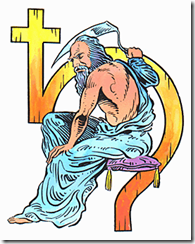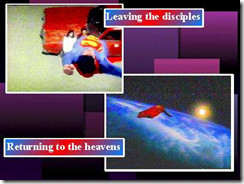Kal El
… Micah El… Michael (could these words be cognates)
Gabriel all Angels end with El, including Ang(El).
Jor – Jah Jah-El, Yah-El… Jor-El
angel
[12] In a sense, English already had this word in Anglo-Saxon times; texts of around 950 mention englas ‘angels’. But in that form (which had a hard g) it came directly from Latin angelus. The word we use today, with its soft g, came from Old French angele (the ‘hard g’ form survived until the 13th century). The French word was in its turn, of course, acquired from Latin, which adopted it from Greek ángelos or ággelos. This meant literally ‘messenger’, and its use in religious contexts arises from its being used as a direct translation of Hebrew mal’ākh ‘messenger’, the term used in the scriptures for God’s intermediaries.
The “Canaanite El” worship appears to have syncretized with Hebrew mythology, the later perhaps evolving out of the former, and there are instanced of this evolution present in the Hebrew bible. In the earlier texts, their god is refereed to as El, or variations of the name. In Exodus 6:3-4, their god makes this statement:

And I appeared unto Abraham, unto Isaac, and unto Jacob by the name of Ēl Shaddāi, but by My name Yahweh was I not known to them. And I have also established My covenant with them, to give them the land of Canaan, the land of their pilgrimage, wherein they were strangers.
This announcement of a name change appears to have been a scriptural method of converting the Canaanite followers of El to Yahweh worship. Originally, these appear to have been two separate gods, Yahweh being a sky/storm god, El a desert/creator god.
Jor-El is a fictional character from the Superman comic books, published by DC Comics. Created by American writer Jerry Siegel and Canadian-born artist Joe Shuster, he first appeared in Action Comics #1 as Superman's biological father.
Jor-El is a Kryptonian, and the husband of Lara Lor-Van. He is a scientist and leader on the planet Krypton before its destruction. Jor-El foresaw the planet's fate, but was unable to convince his colleagues in time to save their race after his appeals. He was able to save his infant son, Kal-El, sending him in a homemade rocketship to Earth just moments before Krypton's demise
Taken from Wikipedia: Dec 2, 2009 -http://en.wikipedia.org/wiki/Jor-El



Please note on Jor-El’s chest not a RED SUN, or A SUN, or AN ‘S’ or any Kryptonian symbol but the PLANET SATURN….
Note the planet Jor-L and Lora are looking at! If you zoom this pic you’ll be able to read in the text more biblical reference to an ARK of SPACE… very Argha Noa-ish or Ark of Noah eh!

Don’t miss Jor-El’s crowns of thorns eh… or should we say HALO
From Krypton to Kronos
Krypton (; from kryptos "hidden")
Cronus was also identified in classical antiquity with the Roman deity Saturn. In the Alexandrian and Renaissance periods Cronos was interpreted with the name Chronos. Another theory holds that it may be related to "horned", suggesting a possible connection with the ancient Indian demon Kroni or the Levantine deity El.
In Greek mythology, Chronos (Ancient Greek: Χρόνος) in pre-Socratic philosophical works is said to be the personification of time. His name in Modern Greek also means "year" and is alternatively spelled Khronos (english transliteration) or Chronus (Latin spelling).
Chronos was imagined as an incorporeal god. Serpentine in form, with three heads—that of a man, a bull, and a lion. He and his consort, serpentine Ananke (Inevitability), circled the primal world-egg in their coils and split it apart to form the ordered universe of earth, sea and sky. He is not to be confused with the Titan Cronus.
He was depicted in Greco-Roman mosaics as a man turning the Zodiac Wheel. Often the figure is named Aeon (Eternal Time), a common alternate name for the god.
Chronos is usually portrayed through an old, wise man with a long, gray beard, such as "Father Time."
Cronus (Saturn)
Cronus (known as Saturn in Roman mythology) was the god of Time and the son of Uranus and Gaea.
Cronus' brothers and sisters were the Titans and because of a revolt against their father Uranus Cronus became the King of the Gods.
Cronus was always afraid that his kids would overthrow him so he ate them and when Rhea his wife had their last child Zeus she tricked Cronus into eating a rock instead of Zeus. Like Cronus was afraid , Zeus overthrew him with the help from his sisters and brothers.
Let us take a look into time… Sunday is the day of worshipping the Sun God, Monday, the Moon god, Tuesday , Wednesday, Friday, and Saturday is the day for worshipping Saturn the Canaanite god El

Heptagram
Weekday heptagram
The order of the week days can be derived "geometrically" from an acute heptagram, the {7/3} star polygon (as 24 mod 7 = 3). The luminaries are arranged in the same Ptolemaic/Stoic order around the points of the heptagram. Tracing the unicursal line from one planet to the next gives the order of the weekdays.
The term "Sabbath" derives from the Hebrew shabbat (שבת), "to cease", which was first used in the Biblical account of the seventh day of Creation (Genesis 2:2-3)
Sabattum as the 15th day of the lunation: this word is cognate with Hebrew Shabbat, but is monthly rather than weekly; it is regarded as a form of Sumerian sa-bat ("mid-rest")
In astrological theory, not only the days of the week, but the hours of the day are dominated by the seven luminaries. If the first hour of a day is dominated by Saturn (![]() ), then the second hour is dominated by Jupiter (), the third by Mars (), and so on with the Sun (), Venus (), Mercury (), and the moon (), so that the sequence of planets repeats every seven hours. Therefore, the twenty-fifth hour, which is the first hour of the following day, is dominated by the Sun; the forty-ninth hour, which is the first hour of the next day, by the Moon.
), then the second hour is dominated by Jupiter (), the third by Mars (), and so on with the Sun (), Venus (), Mercury (), and the moon (), so that the sequence of planets repeats every seven hours. Therefore, the twenty-fifth hour, which is the first hour of the following day, is dominated by the Sun; the forty-ninth hour, which is the first hour of the next day, by the Moon.
Saturday: the only day of the week to retain its Roman origin in English, named after the Roman god Saturn associated with the Titan Cronus, father of Zeus and many Olympians. Its original Anglo-Saxon rendering was Sæturnesdæg (pronounced [sæ.tur.nes.dæg] or [sæ.tur.nes.dæj]). In Latin it was Dies Saturni, "Day of Saturn"; compare: French Samedi. The Spanish and Portuguese Sábado, the Romanian Sâmbătă, and the Italian Sabato come from Sabbata Dies (Day of the Sabbath).
Sunday: Old English Sunnandæg (pronounced [sun.nan.dæg] or [sun.nan.dæj), meaning "Sun's Day". This is a translation of the Latin phrase Dies Solis. English, like most of the Germanic languages, preserves the original pagan/sun associations of the day. Many other European languages, including all of the Romance languages, have changed its name to the equivalent of "the Lord's day" (based on Ecclesiastical Latin Dies Dominica). Compare: Spanish and Portuguese Domingo, French Dimanche, Romanian Duminică and Italian Domenica. In both West Germanic and North Germanic mythology the sun is personified as a goddess; Sunna/Sól

Revelations 1:14 … and his eyes [were] as a flame of fire.
Revelations 1:16 …and his countenance [was] as the sun shineth in his strength.
THE HOUSE OF EL
according to DC Comics
The House of El was one of the noble ruling families of the planet, Krypton. The name El translates in Kryptonian to "of the Star". The family line extends back thousands of years, to a time when tribes of Kryptonians still waged war against one another across the continents. The direct descendants of Jor-El the First sired children whom would become the sole survivors to escape Krypton's ultimate destruction - Kal-El and Kara Zor-El. The bloodline continued through the centuries with the births of Kal-El's Kryptonian/Human hybrid children with wife, Lois Lane.
The earliest known members of the El family line existed during Krypton's pre-industrial age when Kryptonians were known by only a single name. The first recorded member of the family line was Feln, who was the father of Rugad, who was the father of Tomnu. Tomnu's son, Erok became the first Kryptonian to create clan names and called himself Erok-El, or, Erok of the Star. His wife was Milia, the daughter of an opposing Bethgar named Uved. Erok-El and Milia gave birth to Kal-El the First, who became the second Bethgar of the continent of Urrika. Kal-El's son, Wab-El did not share his ancestor's noble qualities and became a vicious warlord. Wab-El had two sons, Vad-El and Hyr-El. Vad-El became a tyrant like his father, and Hyr-El disowned the family name after a feud with Vad-El. Hyr-El's direct family lineage is what eventually evolved into the modern House of El







